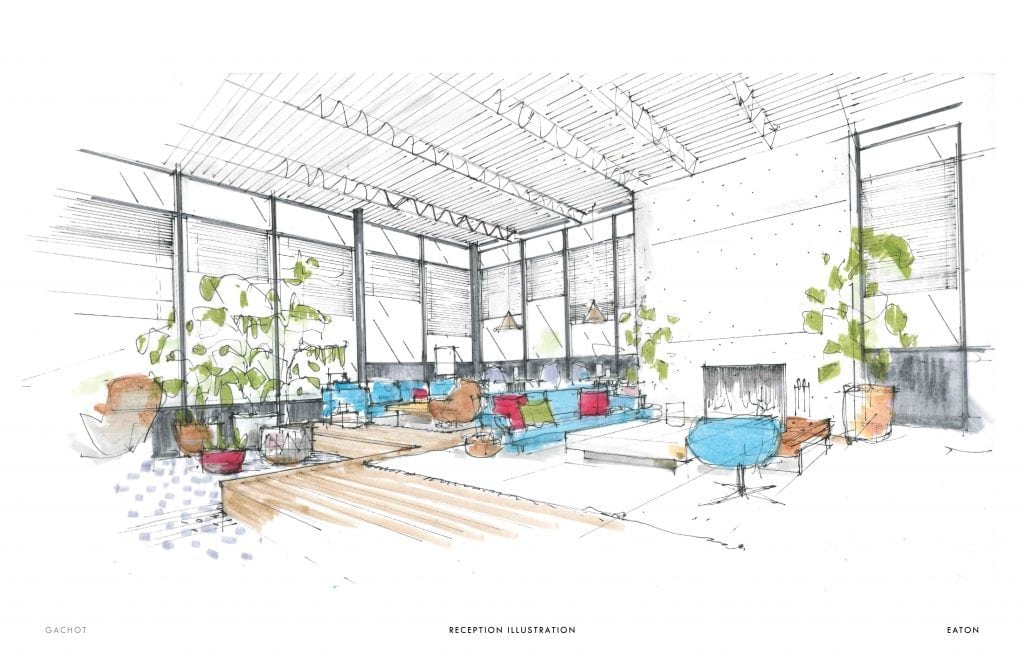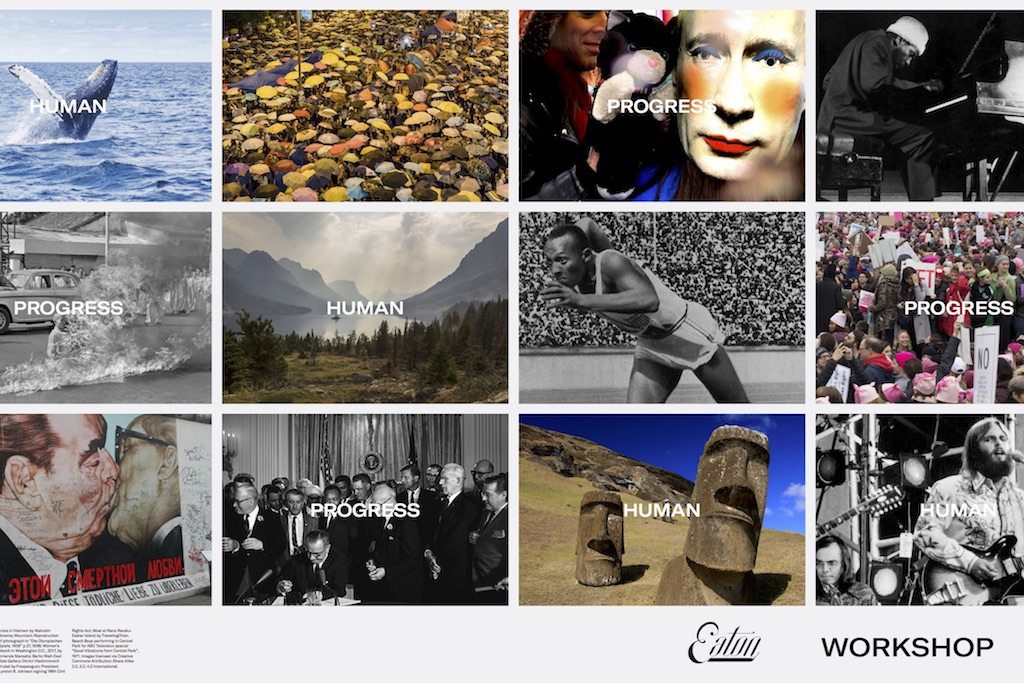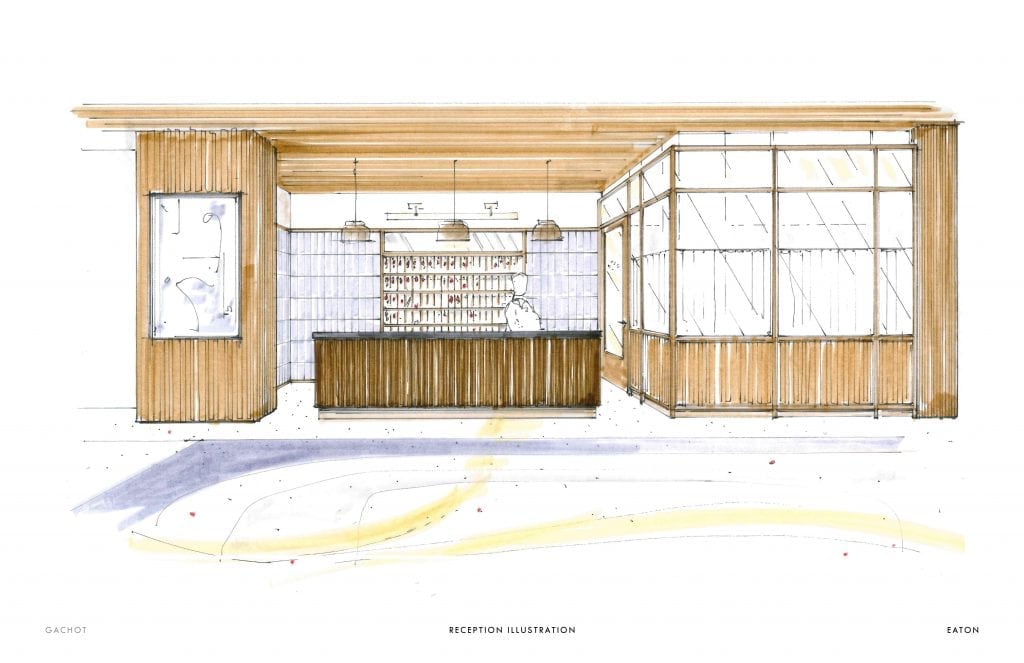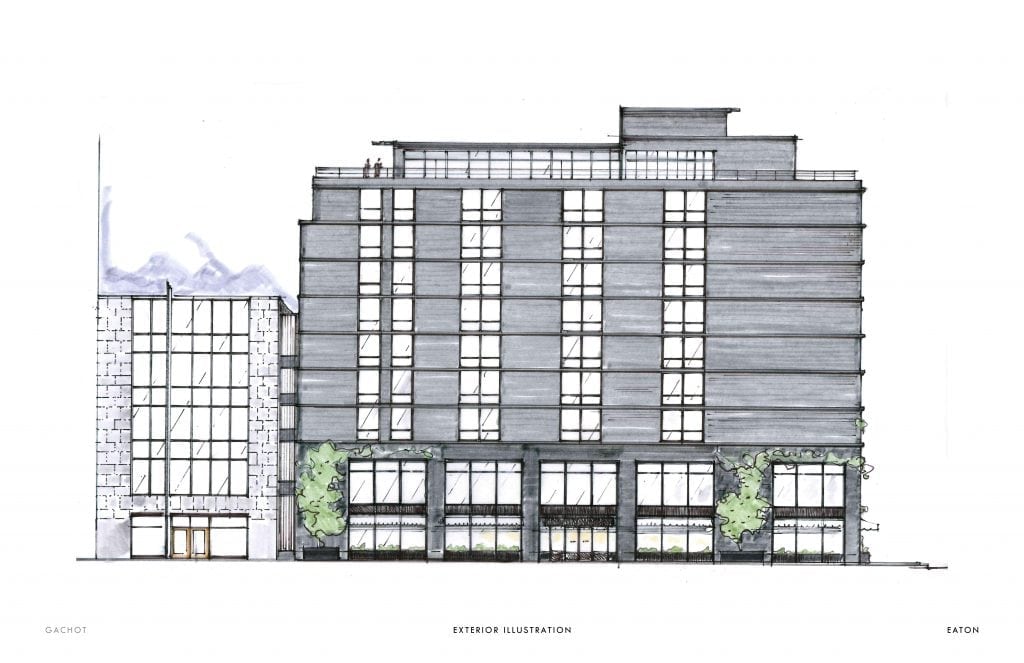Skift Take
So many brands today say they're committed to social causes — but how many of them actually stick to those commitments? And how many of those companies are actually sustainable or profitable? Will Eaton Workshop be an exception?
Eaton Workshop may not sound like the name of a millennial-minded lifestyle hotel brand committed to “progressive social change.”
But there’s a reason for that, said Katherine Lo, the brand’s founder and CEO.
Three or four years ago, Lo’s father Ka Shui Lo, who heads up Hong Kong-based Great Eagle Holdings, asked her to reinvent the tired, generic three-to-four-star Eaton Hotels brand that he launched back more than two decades ago.
Great Eagle is also the parent company of the luxury Langham Hotels brand, and Katherine Lo, a filmmaker and entrepreneur, played a pivotal role in the development and design of Langham’s flagship property in Chicago, which opened in 2013.
While her father gave Katherine Lo carte blanche to design a hotel brand to suit her tastes and that of a new generation of travelers, the one stipulation he gave her was that the Eaton name had to remain. Lo said her father had a sentimental attachment to the name because it was inspired by the grand Eaton Centre department store he visited as an international student in Montreal, a place that instilled a “sense of wonder” in him.
Lo said her father asked her to reinvent the Eaton brand as “he started to see the world changing around him in a very revolutionary way because of technology, and the business model potential of the lifestyle or boutique hotel model, versus luxury hotels.”
Ka Shui Lo then decided to end all of his Eaton Hotels management contracts, only keeping the Eaton Hong Kong, which remains open but will eventually be transformed into Eaton Workshop’s second hotel.
And thus, Eaton Workshop, “a new brand merging hospitality with social progress,” was born. The first two properties, both revamps of existing hotels, are slated to open next year, first in Washington, D.C. with a 209-room hotel, and then in Hong Kong with 400 rooms. They would be followed by two newbuild hotels in San Francisco (180 rooms) and Seattle.
The Old Eaton Versus The New Eaton
As Lo debuts this new hotel brand with an already established history, there’s certainly the possibility that some consumers might confuse the old Eaton Hotels with the new. Still, she’s hopeful the differences between the two will be dramatic enough for people to distinguish between the two.
“Yeah, we are definitely concerned about it,” Lo said, “but I think with hopefully with the very strong brand identity of the new brand and good enough storytelling and PR [public relations], that it’ll soon become clear to the public that this is a very different brand, and hopefully they’ll just forget about the old brand.”
There is some reason for concern.
“The brand has the right idea, of using storytelling and PR to reposition the brand with its new identity,” said Makarand Mody, assistant professor of hospitality marketing at the Boston University School of Hospitality Administration. “However, some of the baggage with the previous brand, or in this case, the lack of any real positioning in the past, may carry over simply because of the Eaton name.”
Still, Mody thinks Lo may have “room to play with this idea” of “merging hospitality with social progress” if she leverages the inspiration underlying the story of Eaton Workshop.
The difference between the Eaton of old and the new Eaton could not be more distinct. The former Eaton hotels were “just a more general, three- to four-star, lower-tier version of the Langham Hospitality Group,” Lo described. “That brand did not really have any distinctive qualities or missions in any way.”
In 2014, there were already signs that Langham wanted to reinvent its Eaton hotel brand.The new Eaton Workshop, which will debut, in 2018, has a very distinct viewpoint, look, and feel, said Lo.
“We really try to access and speak to a very specific audience through shared values. Eaton Workshop is more geared toward this new world where younger generations are especially focused much more on values and experiences, rather than traditional luxury benchmarks. Of course, we do care a lot about design and style, but what’s much more important are the values of wanting to make the world a better place and also being a platform for the community that we’re in.”
But is Lo at risk of narrowing her brand focus so much that she might exclude older audiences, or those who don’t necessarily want to play a part in social change with every hotel stay?
“Research does suggest that younger generations seek out brands that are consistent with their own values, and social progress, broadly speaking, is one of those ideals,” Mody said. “However, the danger with adopting such a positioning is that it can become too narrow, and turn away those younger travelers, who, for example, want the unique experience but not the reminder of having to contribute to change every time they stay at a hotel. The ‘Workshop’ element connotes a level of activism that not every younger traveler may want to subscribe to. However, it is a powerful differentiator in a crowded technology-based lifestyle segment, so I can see the attractiveness of it.”
Eaton Workshop will pursue LEED certification, holistic wellness centers, cultural programming that benefits the local community, and a members-only co-working space that favors nonprofits and companies committed to social change.
Sagmeister & Walsh and Project Projects worked on the brand’s design and digital content platform, and Lo hired Gachot Studios as creative consultants. Parts and Labor Design, and AvroKO were hired to do the interior design for the hotels, and Leong Leong and Kengo Kuma and Associates were hired for design architecture. Chefs Tim Ma and Derek Brown will handle food and beverage in D.C. and renowned Hong Kong chef Alan Lo will lead cuisine at the Hong Kong hotel.
When asked what star level or hotel chain scale category would best describe it, Lo responded, “It would probably be somewhere near the same level of the Soho House, Ace Hotel, Standard Hotels, or the Sydell Group hotels,” adding, “We’re trying to go beyond that star system and be more focused on experiences and values as the main driving point for the clientele.”
When asked Lo who would want to stay at the new Eaton Workshop hotels, she said, “I hope that Eaton will speak to people who are this new nomadic class of co-working or freelance workers, or writers — this new community that’s growing and tied together by their shared ethos.”
She said she developed this brand with herself and her peers in mind “because I think this is a brand that’s for the newer generations who are becoming more socially conscious and who want to work for businesses that share their values, or to stay at places that reflect them.”

Another rendering of the reception area in the upcoming Eaton Workshop D.C. property. Source: Eaton Workshop
Are Consumers Ready for a Socially Progressive Hotel Brand?
While much has been noted about younger generations ascribing to this value of wanting to effect social change and being devoted to social causes, are they willing to pay some $250 to $270 per night to do that? Those are the going rack rates at the first Eaton Workshop in D.C.
Gen Z, in particular, is known for placing a greater emphasis on social causes. But can millennials and Gen Z members actually afford to stay at an Eaton Workshop?
Lo said the future San Francisco property, there will be a full floor of “hostel rooms” or rooms with two bunk beds, similar to how brands like Marriott’s Moxy Hotels and Pod Hotels have done to appeal to more price-conscious travelers.
Many of the Eaton Workshop brand features are things that other hotel companies have ventured to do before. Examples include recording studios at W Hotels, the “Living Stage” at Red Lion’s Hotel RL brand, the salon series launched by Hyatt’s Andaz hotel brand, and the unofficial co-working space/lobby of the Acre Hotel in New York. The difference with Eaton Workshop, however, is that all of these things are tied to this concept of social good, or change.
But will this concept work? Are consumers willing to pay more than $200 a night for these types of experiences? Will Eaton Workshop suffer from an overload of too much cultural programming? Or not enough?
Marcie Merriman, executive director for EY and a brand strategy and retail innovation leader, said, “Gimmicky marketing doesn’t get you very far today. Younger people are looking for real value in what you’re providing.”
That being said, she wonders if Eaton Workshop should take its commitment to social good a step further.
“One of the hallmarks of Gen Z is wanting to be part of the solution and being involved,” Merriman said. “Millennials have a huge respect for sustainability, and they look to companies to do it, and they put those companies in higher regard. Gen Z actively wants to help with sustainability.”
Mody has some doubts. “I think Gen Z is still several years out from being a sufficiently large, profitable hotel segment,” he said. “And I don’t think any brand really has a definitive handle on what millennials want. So, yes, while having younger markets in mind, why not design an experience than transcends age and generations and is attractive to a younger mindset instead? For example, the proportion of those in Gen X who identify as liberal is at its highest point since 2000. Marketing across generations is not an easy thing to do, but I do think the brand has to have appeal beyond the confines of a specific generation to be sustainable in the long run.”
Merriman believes Eaton Workshop has to take the next step.
Of Eaton Workshop, Merriman said, “This chain is onto the right idea, but they could take it even further. Millennials respect those companies but won’t pay more for it. But with Gen Z, if [Eaton Workshop] were to offer experiences, like set up experiences where they connect guests to a food bank to help or volunteer, those are the types of experiences that this younger group values.”
Mody, however, disagrees. “I see some of the other experiential elements — particularly the social spaces, health and wellness, and food and beverage — as value drivers that make the experience worth the money. The social progress, on the other hand, provides a differentiated positioning that needs to be seamlessly weaved into the brand experience.”
Merriman may be onto something with letting guests have a more hands-on approach to activism and community outreach but, as we saw with the demise of Carnival’s Fathom cruise line, voluntourism may not always have broad market appeal for now, at least.
Mody, for one, thinks that if Eaton Workshop can further its idea of social progress but not make it seem like voluntourism, then the brand may be more successful.
“If this idea of social progress can be communicated at a level that does not suggest voluntourism, and that it is really an automatic benefit of associating with the brand, then it will work,” he said. “Look at what happened with Carnival’s Fathom brand, where the idea was indeed different, but didn’t have traction in the marketplace: it asked too much of the consumer in a type of experience that is to a large extent driven by fun and escapism. In the hotel context, a brand’s experience of the social spaces and food and beverage are the key drivers of lifestyle brands, and that’s where Eaton will have to deliver a top-notch product. This is something that will sustain the brand into the future.”
What Goes Into a Socially Progressive Hotel Brand
So, how exactly does one go about launching a hotel brand committed to “progressive social change”? That’s what Lo and her team are in the process of doing.
“I’m really interested in proving that a social enterprise, or a business with a social mission, at a global scale, can succeed and be profitable,” she said.
Lo said she is working with legal counsel to explore the possibility of Eaton Workshop getting incorporated as a B Corp, a for-profit company certified by the non-profit B Lab organization for meeting rigorous social and environmental performance, accountability, and transparency standards. Other famous B Corp companies include Patagonia, Warby Parker, and Ben & Jerry’s.
“You’re not only measured by your financial performance, but by how well you perform in terms of an ethical charter,” she said.
Lo said she envisions Eaton Workshop’s profits being used to fund all of the company’s nonprofit and cultural activities and programming. “It’s almost like a self-sustaining circle where the room and food and beverage revenue will fund cultural activities, which will hopefully draw guests to come back and say there.”
The types of cultural activities and programming to be funded by Eaton Workshop include: an on-site radio station at each location, live music venues and concerts, visual artists’ studios in D.C., recording studios in Hong Kong, an artist-in-residence series, cinema, art galleries, wellness centers, and even in-room “activist tool kits” with Congressional members’ contact information in the inaugural D.C. location. Eaton Workshop also plans to run mentorship and hospitality training programs for local youth.
“We’re moving beyond traditional hospitality to not only care about private luxury anymore, but care more about experience, and also community-based experiences in hospitality,” Lo said.
Another feature of Eaton Workshop is that each location will have at least 20,000 square feet of space dedicated to Eaton House, the brand’s members-only co-working unit. Programming at Eaton House will be shared with the hotel and its guests, and will include speakers, concerts, panels, and fireside chats.
The membership process to join Eaton House will also be different from other members-only clubs. “Whereas Soho House caters to creatives and WeWork lets everyone in, ours will be a very curated membership process where we specifically try to support like-minded business, startups, or individuals with similar values,” said Lo. As examples, she mentioned nonprofits dedicated to women’s rights, social change, race relations, and environmental issues.
Mody said the Eaton Workshop team needs to make sure its social programming, while a major draw, isn’t too narrow. “The programming also has to be carefully designed,” he said. “While younger generations tend to be more liberal because of their age, there is some research to suggest that they are more conservative than young people in previous decades. Thus, the programming will have to be carefully curated to not be too one-sided to turn people off the brand. Social causes at large work, but those causes that have political leanings can be tricky. So, in my opinion, the programming and content has to be socially relevant, and politically as agnostic as possible to create a wider appeal.”
Lo said she especially sees each of the hotels as media and content creation hubs for both travelers and locals, thanks to the on-site radio station and other programming, and that the company is also investing heavily in making sure its own website is rich in digital content, including the hotels’ own radio podcasts.
But as far as technology investments go, Eaton Workshop is going to play it safe for now. “We at first were going to develop our own app,” she said. “But we decided that we are actually more focused on the real-life experiences that are happening on the properties, so for now we will not be developing any internal or new technology for Eaton.”
And as for loyalty, she said they haven’t yet decided whether Eaton Workshop will be connected to Langham Hotel Group’s 1865 loyalty program, but made it clear that the Eaton Workshop and Langham brands are very different. “I can’t answer that yet,” Lo said, when asked if both brands would share a loyalty program, “but we’re actually assuming the audiences are very different … so likely not. But that’s definitely been a debate that we’ve been having.”
One big hurdle Eaton Workshop has already cleared is the fact that Great Eagle will be both the owner and the operator of the first four Eaton Workshop properties, giving it “full control over the projects.”
Eventually, however, Lo hopes the model will be so successful that it can expand to a management contract business as well.
“If hotels could enrich the holistic inner life as well as the outer health of guests, but also improve the community and the world in socially impactful ways, I think that’s definitely the future of the hospitality industry,” she said.
Is Eaton Workshop a glimpse into the future of hotels? We’ll have to wait until next spring when the first property opens but, so far, Mody thinks the brand’s “emphasis on social spaces, cultural activities, and programming” bode well for this new Eaton.
“They are spot-on with the fact that such experiences can transcend the shackles of star levels and appeal to people looking for a unique experience. To go beyond social progress as a CSR [corporate social responsibility] initiative or a PR activity, and to really embed these values seamlessly into the experience is not easy, but some of the early signs look promising,” he said.
Have a confidential tip for Skift? Get in touch
Tags: langham, millennials
Photo credit: A promotional image for Eaton Workshop, a reinvented hotel brand focused on social impact that's being launched by the parent company of Langham Hotels. Eaton Workshop


